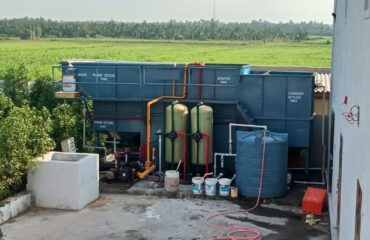Introduction
Firozabad, renowned for its glass industry, is also advancing in healthcare to cater to its growing population. As the city’s hospitals expand, the need for effective wastewater management becomes increasingly urgent. Hospital wastewater contains a complex mix of contaminants, including chemicals, pharmaceuticals, and pathogens, which can pose serious risks to both the environment and public health if not treated properly. The installation of Sewage Treatment Plants (STPs) in hospitals is essential to address these challenges. Amrita Water Solution offers advanced STP solutions that are specifically designed to manage and treat hospital wastewater in Firozabad, ensuring that the city’s healthcare growth is both sustainable and safe.
Importance of Sewage Treatment Plants for Hospitals in Firozabad
Hospitals in Firozabad generate significant amounts of wastewater, which, if discharged untreated, can contaminate local water sources, harm aquatic life, and spread diseases. The presence of untreated pharmaceutical residues, chemicals, and pathogens in hospital wastewater is particularly concerning, as it can lead to the development of antibiotic-resistant bacteria and other public health threats.
STPs are crucial for treating this wastewater before it is released into the environment. By removing harmful contaminants, STPs help to protect Firozabad’s water bodies, ensure public health, and preserve the natural environment. As the city continues to grow and modernize, the implementation of STPs in hospitals is key to balancing urban development with environmental sustainability.
Benefits of Sewage Treatment Plants for Hospitals
- Environmental Protection: STPs effectively treat hospital wastewater, removing harmful substances that could otherwise pollute local water bodies and ecosystems, thereby preserving Firozabad’s natural environment.
- Public Health Safety: By eliminating pathogens, chemicals, and pharmaceutical residues, STPs reduce the risk of waterborne diseases and contribute to the overall health and safety of the community.
- Regulatory Compliance: Hospitals equipped with STPs can meet stringent environmental regulations, avoiding legal penalties and ensuring that their operations are sustainable and compliant with local and national standards.
- Resource Conservation: Treated water can be reused for various non-potable purposes, such as landscaping, cleaning, or cooling, reducing the demand for fresh water and promoting sustainable water management practices.
- Community Reputation: Investing in STPs demonstrates a hospital’s commitment to environmental stewardship and public health, enhancing its reputation and fostering trust within the Firozabad community.
Conclusion
The installation of Sewage Treatment Plants in hospitals is a vital component of sustainable healthcare in Firozabad. By adopting advanced STP solutions from Amrita Water Solution, hospitals can effectively manage their wastewater, protecting both the environment and public health. As Firozabad continues to develop, the role of STPs in hospitals will be crucial in ensuring that growth is accompanied by responsible environmental practices, ultimately leading to a healthier and more sustainable future for the city.





